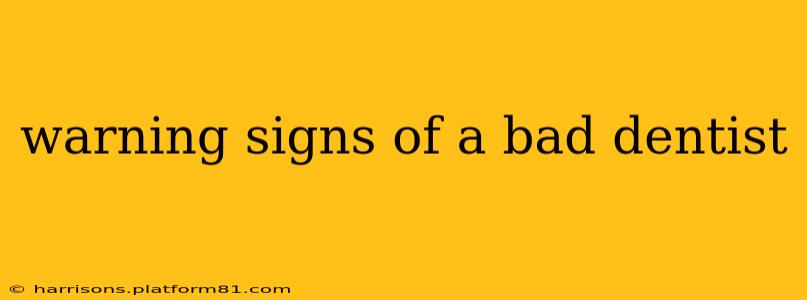Finding a good dentist is crucial for maintaining optimal oral health. Unfortunately, not all dentists provide the same level of care and professionalism. Recognizing the warning signs of a bad dentist can save you from potential pain, unnecessary procedures, and costly mistakes. This comprehensive guide will highlight key indicators to watch out for, empowering you to make informed decisions about your dental care.
What are the signs of a bad dentist?
This question often arises from patients concerned about the quality of care they are receiving. Several red flags can indicate a dentist isn't meeting professional standards. These range from poor communication and hygiene to questionable treatment recommendations. Let's explore these in detail.
Does a bad dentist always rush through appointments?
Yes, rushing through appointments is a significant warning sign. A rushed dentist might miss crucial details during examinations, leading to misdiagnosis or inadequate treatment. Proper dental care requires thoroughness, and a rushed approach suggests a lack of commitment to patient well-being. If your dentist consistently seems hurried, consider seeking a second opinion.
How can I tell if my dentist is incompetent?
Incompetence manifests in various ways. One clear sign is a high rate of complications or negative patient outcomes. Persistent pain after procedures, recurring dental problems, or the need for repeated treatments following your dentist’s work all point towards potential incompetence. Additionally, a dentist who struggles to explain procedures clearly or demonstrates a lack of up-to-date knowledge could be considered incompetent.
What are the signs of a dentist who is only interested in making money?
While dentists are professionals who deserve fair compensation, prioritizing profit over patient health is unethical. This can manifest as recommending unnecessary procedures, aggressively pushing expensive treatments without clear justification, or failing to explore less costly alternatives. Always seek a second opinion for significant procedures or expensive treatments to ensure they are truly necessary.
What should I do if I suspect my dentist is unethical?
If you suspect unethical practices, document your concerns carefully. Keep records of appointments, treatments, and any communication with the dentist. You can then file a complaint with your state's dental board. Many boards have online resources to guide you through the complaint process. Consider seeking a second opinion from another dentist to get an independent assessment of your situation.
What are some red flags to watch out for in a dental office?
Beyond the dentist themselves, the overall office environment can also reveal red flags. A consistently unclean or unorganized office suggests a lack of attention to detail and hygiene standards, potentially impacting the quality of care. A disorganized office might also indicate poor record-keeping practices. Furthermore, a lack of patient privacy or uncomfortable waiting room conditions are also important factors to note.
How can I find a good dentist?
Finding a reputable dentist is a proactive step in ensuring good oral health. Ask friends and family for recommendations, read online reviews focusing on patient experiences, and check your dental insurance's network of providers. Don’t hesitate to schedule consultations with multiple dentists before making your decision. During consultations, pay attention to the dentist’s demeanor, their explanation of procedures, and the overall cleanliness of the office. Trust your instincts; if something feels off, it’s wise to seek a second opinion.
Conclusion:
Choosing the right dentist is a critical decision impacting your long-term oral health. By being aware of these warning signs and taking proactive steps to verify your dentist's credentials and practices, you can significantly reduce your risk of encountering incompetent or unethical care. Remember, your oral health is a priority, and you deserve a dentist who prioritizes your well-being above all else.
